Oracle support costs never go down. Learn how Oracle’s repricing rule traps organizations into overspending — and how to break free.
Why Your Oracle Support Bill Never Shrinks
Have you ever wondered why your Oracle support invoice looks higher year after year, even though your organization no longer uses all those licenses?
It seems logical: when software is retired, support costs should decline. But with Oracle, the opposite is often true. This is not an accident. It’s the result of Oracle’s repricing rule, a policy that keeps clients locked into paying for unused licenses long after they stop delivering business value.
The financial waste is staggering. We regularly meet organizations spending hundreds of thousands each year on support for licenses that have been retired or are no longer in use. For larger enterprises, this can easily climb into the millions. Yet Oracle’s rules make it almost impossible to exit gracefully.
The Repricing Rule: Oracle’s Silent Revenue Engine
Oracle’s repricing rule is one of the least understood but most consequential aspects of its support policies. Here’s how it works:
- When you attempt to reduce your support contract by removing unused products, Oracle eliminates the original discount you negotiated at purchase.
- The entire support fee is then recalculated at current list price, as if you were buying fresh today.
- That 50% discount you secured during tough negotiations ten years ago? It disappears overnight.
This ensures that even if you remove unused licenses, the recalculation often leaves you paying the same amount—or more—than before. Oracle wins. You lose.
Former Oracle auditors on our team confirm what clients have long suspected: the repricing rule is not a side effect, but a deliberate design. It’s Oracle’s way of turning support into a predictable, unshakeable revenue stream.
Why Organizations Fall Into the Trap
Many organizations believe support costs will naturally decline once they reduce usage or consolidate environments. Unfortunately, Oracle’s licensing model is built to prevent that.
Common situations we see include:
- Data center consolidation: Licenses tied to hardware no longer in use still generate full support fees.
- Application retirement: Even when an entire product line is decommissioned, Oracle’s repricing rule blocks cost savings.
- Cloud migration: Moving workloads to AWS, Azure, or GCP does not automatically reduce Oracle support obligations.
Because the repricing rule penalizes reductions, many organizations give up trying and simply continue paying—funding Oracle’s profits without receiving value.
The True Cost of Doing Nothing
Failing to address this issue means locking in unnecessary costs year after year.
- Budgets stay inflated: IT leaders lose funds that could be invested in innovation or modernization.
- Hidden waste grows: Unused licenses quietly accumulate, yet support invoices never shrink.
- Negotiation leverage erodes: By accepting Oracle’s terms, organizations lose bargaining power when renewal time comes.
From our experience, it’s not unusual for companies to be overspending by 20–30% annually on Oracle support simply because of repricing. For many organizations, this translates into hundreds of thousands of euros in unnecessary costs every year.
Breaking Free: Practical, Cautious Steps That Work
Good news: you don’t have to accept high support bills as inevitable. There are legitimate paths to reduce support spend without immediately triggering repricing — but these moves must be handled carefully.
Option 1: Third-Party Support
For older products or software no longer under active development, third-party providers can offer substantial savings. That said, switching support can provoke a response from Oracle — including heightened audit activity. Before making the change, it is essential to know your position and exposure.
That’s why a pre-move internal audit is critical. A short, targeted internal review identifies what you actually run in production, documents historic entitlements, and highlights any weak spots that could lead to surprise costs if Oracle challenges your position. With that fact base you can switch providers or renegotiate with confidence — and avoid creating a doorway for new risk.
Option 2: Expert-Led Oracle Support Optimization
Third-party support is not for everyone. Many organizations prefer to stay with Oracle but still want to reduce costs. In these cases, strategic support optimization is possible — if you know how Oracle structures contracts and enforces the repricing rule.
This is where License Consulting’s unique background matters. As former Oracle auditors, we know how Oracle thinks, what triggers repricing, and where flexibility exists. By applying that insider knowledge, we help clients secure measurable support savings while avoiding the risks of repricing.
💡 Importantly, our engagement model is results-based: fees are only charged when savings are actually achieved — and clients never pay more than they save. That means working with us is always a net gain, with zero financial risk.
Act Early, Not Late
The biggest mistake is waiting until Oracle presents its renewal proposal. By then, most of your leverage is already gone. Begin the analysis months in advance to explore your options while there is still time to act.
Conclusion: Escaping the Oracle Support Trap
Oracle’s repricing rule keeps many organizations trapped in high-cost support contracts, even when licenses are no longer in use. But this situation is not permanent. With timely action, there are safe and proven ways to reduce costs and regain control of your budget.
👉 Don’t wait for Oracle to dictate your next move. Contact License Consulting today to explore proven options for reducing Oracle support costs — without triggering repricing.














